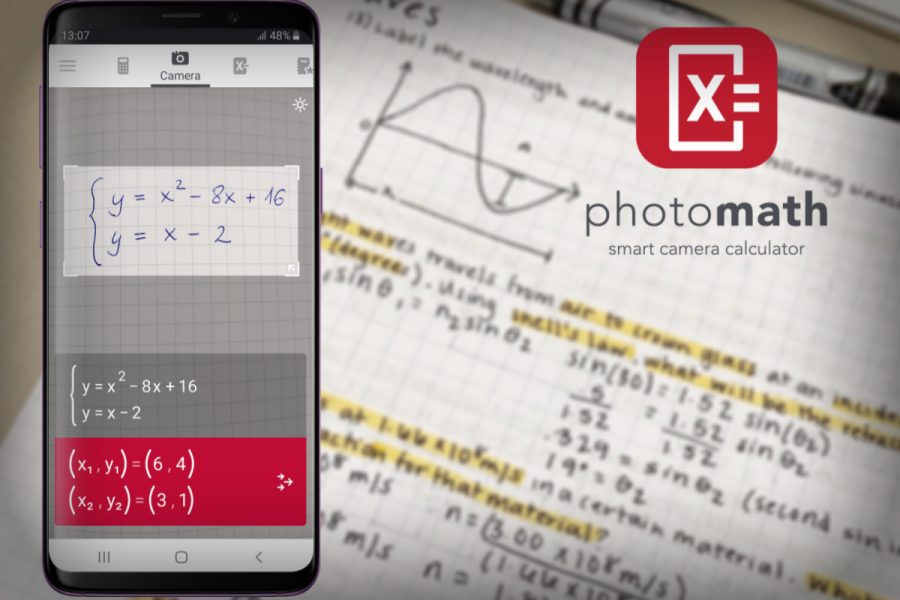Math Help Apps May be More Harmful than Students Realize
MATH HELP APPS MAY BE MORE HARMFUL THAN STUDENTS REALIZE — Popular apps like Photomath make it easy for students to copy answers for their homework, but at what cost?
March 20, 2020
Today’s students are growing up with endless online resources to help them with their homework. Some students particularly struggle with math concepts, so they also have a hard time completing homework that is meant to help them with such topics. Students may use websites and apps like Khan Academy, Wolfram Alfa, and Photomath to assist them in solving math problems.
While the intentions of these programs are to help students understand difficult or new math concepts when they cannot get help from teachers or parents, they may be abused by students who just want to get their homework done.
Many math teachers try to combat cheating, to encourage a deeper understanding of class material, by requiring students to show their work on their homework. However, these math programs often provide the processes used to solve these problems, which allows students to copy answers and show their work easily. As a result, students now have the opportunity to copy their homework simply and accurately.
“Sure, people can use [math assistance programs] to just copy down their homework real quick, but it can actually help you because it shows you the steps, and you can actually learn from it,” explained Cruz Johnson, a freshman at Central.
There are several reasons that students may feel that copying their homework is justified: they believe they will not use the concepts later in life, they feel like they have too much homework, or they feel pressured to get a good grade instead of truly learning the material.
“Some days, you can sit down and do [homework], but if you get like a whole packet… that’s a lot of homework,” said Johnson.
Even though students complain about the amount of homework given in their classes, math teachers explain that homework is necessary to effectively learn the material. Math can differ from other subjects because students must learn processes through practice instead of memorizing facts for tests and other assignments.
Students choose whether they want to study, and that decision may affect their test grade, but teachers do not grade students based on their decision to study. However, often, math homework helps students study for tests , whether they are unit tests, benchmark tests, or end of course exams.
“I think it could be beneficial [to do homework oneself], but most people just use [Photomath] to cheat. Most people will just copy down [answers] to get some homework turned in, and then they never learn the math,” explained Peggy Moyer, Algebra II teacher.
Students express they do not have enough time to complete all the homework they are given, and they feel like they need to use Photomath as a result of all high school’s pressures, such as homework, sports, and extracurricular activities.
“Homework can be overwhelming, but if you get in the habit of doing it every night, it wouldn’t be. If you did half an hour a night, then, you would reasonably keep it under control,” stated Algebra I teacher Kimberly Weems.
Students should consider the benefits of their homework, and how they go about completing it. If students decide to use math help apps to complete their homework, without using the applications to learn the processes that solve the problems, they will not reap the benefits of math practice.
“I think math requires the extra practice that you can’t fit in a 50 minute period, so there needs to be about 10 problems a night. If kids got in the habit of doing that, and actually working out the problems themselves, then I think that they would learn faster… I think kids need to struggle at math,” expressed Weems.
Teachers find constantly, through their teaching, the effects of Photomath, and apps like it, are mostly harmful. Students who use technology to complete their homework will not fully understand the concepts they need to learn, which leaves them lacking a foundation in the future.
“Math builds on itself, so if a student [fails to] understand a concept in the current year they are learning it, then it will come back again and again in the future years as something they ‘were never taught’ by their previous teacher. Since they [have] turned to Photomath, they don’t remember the learning, and it is new information all over again,” explained, Geometry Teacher Beth Rawson.
Therefore, students and teachers are feeling the frustrating effects of technology that was originally meant to be a helpful tool. It would be more helpful for students to reach out to their teachers, parents, or peers who understand the topic for help, rather than copying work down.
“Math requires practice. It’s not always a one-size-fits-all kind of game. You have to really know what you’re doing, what the question is asking, and then decide which method to use in conquering a difficult question. Without practicing, how are you going to know which tool to grab from the tool box? This is why cheating is never a solution; you just fall farther behind,” concluded Rawson.







Mayte Frazao • Apr 1, 2020 at 1:59 PM
I love this app! It works really well! It helped me a lot throughout my years in high school.